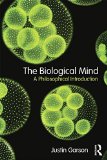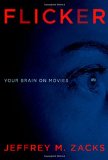November 20, 2014

The Biological Mind: A Philosophical Introduction by Justin Garson (Routledge, 2014)
(kindle ed.), (amazon.co.uk), (UK kindle ed.)
Book description from the publisher:
For some, biology explains all there is to know about the mind. Yet many big questions remain: is the mind shaped by genes or the environment? If mental traits are the result of adaptations built up over thousands of years, as evolutionary psychologists claim, how can such claims be tested? If the mind is a machine, as biologists argue, how does it allow for something as complex as human consciousness?
The Biological Mind: A Philosophical Introduction explores these questions and more, using the philosophy of biology to introduce and assess the nature of the mind. Drawing on the four key themes of evolutionary biology; molecular biology and genetics; neuroscience; and biomedicine and psychiatry Justin Garson addresses the following key topics:
- moral psychology, altruism and levels of selection
- evolutionary psychology and modularity
- genes, environment and the nature-nurture debate
- neuroscience, reductionism and the relation between biology and free will
- function, selection and mental representation
- psychiatric classification and the maladapted mind.
Extensive use of examples and case studies is made throughout the book, and additional features such as chapter summaries, annotated further reading and a glossary make this an indispensable introduction to those teaching philosophy of mind and philosophy of psychology. It will also be an excellent resource for those in related fields such as biology.
See also: Author’s webpage
Comments (0)
- new books,philosophy of mind
November 18, 2014

The Future of the Brain: Essays by the World’s Leading Neuroscientists ed. by Gary Marcus and Jeremy Freeman (Princeton University Press, 2014)
(kindle ed.), (amazon.co.uk), (UK kindle ed.)
Book description from the publisher:
Including a chapter by 2014 Nobel laureates May-Britt Moser and Edvard Moser
An unprecedented look at the quest to unravel the mysteries of the human brain, The Future of the Brain takes readers to the absolute frontiers of science. Original essays by leading researchers such as Christof Koch, George Church, Olaf Sporns, and May-Britt and Edvard Moser describe the spectacular technological advances that will enable us to map the more than eighty-five billion neurons in the brain, as well as the challenges that lie ahead in understanding the anticipated deluge of data and the prospects for building working simulations of the human brain. A must-read for anyone trying to understand ambitious new research programs such as the Obama administration’s BRAIN Initiative and the European Union’s Human Brain Project, The Future of the Brain sheds light on the breathtaking implications of brain science for medicine, psychiatry, and even human consciousness itself.
Contributors include: Misha Ahrens, Ned Block, Matteo Carandini, George Church, John Donoghue, Chris Eliasmith, Simon Fisher, Mike Hawrylycz, Sean Hill, Christof Koch, Leah Krubitzer, Michel Maharbiz, Kevin Mitchell, Edvard Moser, May-Britt Moser, David Poeppel, Krishna Shenoy, Olaf Sporns, Anthony Zador.
Google Books preview:
Comments (0)
- cognitive science,new books
November 17, 2014

Flicker: Your Brain on Movies by Jeffrey Zacks (Oxford University Press, 2014)
(kindle ed.), (amazon.co.uk)
How is it that a patch of flickering light on a wall can produce experiences that engage our imaginations and can feel totally real? From the vertigo of a skydive to the emotional charge of an unexpected victory or defeat, movies give us some of our most vivid experiences and lasting memories. They reshape our emotions and worldviews–but why?
In Flicker, Jeff Zacks delves into the history of cinema and the latest research to explain what happens in your head when you sit down in the theatre and the lights go out. Some of the questions Flicker answers: Why do we flinch when Rocky takes a punch in Sylvester Stallone’s movies, duck when the jet careens towards the tower in Airplane!, and tap our toes to the dance numbers in Chicago or Moulin Rouge? Why do so many of us cry at the movies? What’s the difference between what happened in a movie and what happened in real life–and can we always tell the difference? To answer these questions and more, Flicker gives us an engaging, fast-paced look at the mind’s fascinating relationship with the silver screen.
Google Books preview:
See also: Book website
Comments (0)
- cognitive science,new books
November 12, 2014

Great Myths of the Brain by Christian Jarrett (Wiley Blackwell, 2014)
(kindle ed.), (amazon.co.uk), (UK kindle ed.)
Book description from the publisher:
Great Myths of the Brain introduces readers to the field of neuroscience by examining popular myths about the human brain. Explores commonly-held myths of the brain through the lens of scientific research, backing up claims with studies and other evidence from the literature Looks at enduring myths such as “Do we only use 10% of our brain?”, “Pregnant women lose their mind”, “Right-brained people are more creative” and many more. Delves into myths relating to specific brain disorders, including epilepsy, autism, dementia, and others Written engagingly and accessibly for students and lay readers alike, providing a unique introduction to the study of the brain Teaches readers how to spot neuro hype and neuro-nonsense claims in the media.
Google Books preview:
See also: Author’s website
Comments (0)
- cognitive science,new books,psychology






